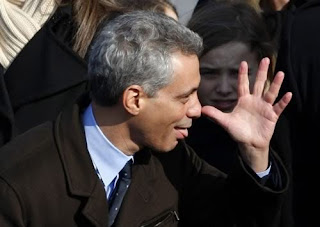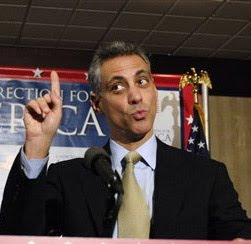.
With the imminent departure of his top two White House aides, Rahm Emanuel, chief of staff, and David Axelrod, political director, along with the departure of his three top economic aides, Barack Obama has a chance to restructure his administration and put in place a team that can actually carry out his former campaign promises for a bipartisan and gentler governing to end the bitter partisanship plaguing our nation's government.
Almost a year ago I urged Obama to make Evan Bayh, the retiring Senator from Indiana, his next chief of staff and now more than ever I think it is the best way to heal America. Back then I said the following:

The Associated Press said in yesterday's stunning announcement that:
"Two-term Sen. Evan Bayh says ever-shriller partisanship and the frustrations of gridlock made it time for him to leave Congress. Republicans aren't buying it, saying he and fellow Democrats sense that voters will be after their heads this fall.
The Indiana Democrat, a moderate who twice came close to being added to his party's national ticket, said Monday he will not seek re-election this November. The announcement gives Republicans a strong chance of capturing his seat and makes it likelier that the 59 votes that give Democrats command of the 100-seat Senate will dwindle.
Bayh, 54, said his passion for helping people is "not highly valued in Congress." He said he did not love the institution in which his father, Birch Bayh, had also represented Indiana."

Well I for one don't really believe his explanation. Bayh was a potential powerhouse among moderate Democrats with a history of working for bi-partisan government. His credentials were everything the American people are looking for in leaders of the new America.
There are several reasons I think he retired and having watched his career, I do not doubt the veracity of what he said. His Midwest background and father's influence are indeed significant causes for him to express frustration with liberal Democrats and the inertia of Congress. His acute awareness of the unfair need for elected officials to spend much of their time raising money for the next campaign is exactly why I got out of politics so I am encouraged he pointed out the huge flaw in our political system.

Yet there is more I suspect beneath the surface because a person like Bayh is needed now more than ever. To explain let me first outline what else happened yesterday when he announced he was retiring at the end of the year. The most powerful person in the Senate, Democratic leader Harry Reid, did not find out about this dramatic development until after Bayh made the announcement. It is unheard of that a party boss would be left out in the cold on such an important matter impacting on the future control of the US Senate by the Democrats.
Yet immediately after he made the announcement the President and White House praised Bayh and said they were aware of his decision beforehand. Why would he consult the president and not the leader of the Senate where he is a member? Let me give you a clue.
The White House has demonstrated how to mismanage the presidency to a degree not often seen before with tactics that infuriated both the Democrats controlling the House and Senate as well as the public and the Republicans. Since before Obama took office I pointed out how they were making one of the first sins of government, expecting the hard nosed opportunists from the campaign to be able to run the nation's government.

No newly elected president has done that because they know the campaign people have neither the experience nor the ability to work with all elected officials, Democrats and Republicans, once elected. By nature the campaign people are paranoid, living in constant fear the other politicians will undermine their efforts. To compensate they use heavy handed tactics to force loyalty from their own party, Democrats, and use intimidation and threats to try and control the opposition party, the Republicans.
It never works. All new administrations make a series of staff mistakes that take one to two years to correct. Obama made these mistakes throughout his fledgling administration loading his staff with friends and associates, campaign contributors and lobbyists. Time after time his own people have been his biggest burden and their actions have upset those who know what makes the government tick.

To be successful a president must surround himself with people who are not paranoid and who know they must govern for all the people, not just those throwing money at them. Thus the White House staff is a sea of turmoil when they have no policy, executive nor practical experience in a bi-partisan world.
Such appointments are not necessarily a sign of weakness but a sign of inexperience. In time the polls and the inability of the president to govern make these mistakes obvious. Perhaps Obama has finally seen the light and realizes his strident and petty staff are his own worst enemy.

Chief of Staff Rahm Emanuel has been the most striking example of how a staff member can get a president in trouble. Every major failure of the Obama administration can be laid at the doorstep of the Chief of Staff from secret deals with the pharmaceutical companies and unions (SEIU) to interfering in local elections (New Jersey, Virginia and Massachusetts).
When your key aide is the cause of your failure to govern the key aide becomes an untenable liability and now many people are questioning the judgment of Obama's Little Napoleon. I suspect the reason Obama knew about the Bayh resignation in advance is that Obama may have talked to Bayh about taking over as his new Chief of Staff. It was necessary for Bayh to clear the way to move to the White House and take over.
By announcing his retirement when he did, the day before the filing deadline for someone to run for his Senate seat, it left no one time to file as the Democratic candidate for Senate from Indiana. Since no one expected Bayh to leave no one was prepared to file the next day. This means the State Democratic party in Indiana can select the next candidate for the people, giving them time to recruit the best possible candidate for the race.
It is all too convenient for Bayh to end up taking over as Chief of Staff for Obama and solving one of the biggest headaches for the president, how to get Emanuel out of there. Bayh could resign at any time and his seat would be filled by governor's appointment. The governor is a Republican in Indiana but Bayh could make a deal with him on his replacement, appointing a Democrat who will not run for office in the fall. The Indiana governor is a weak form of state organization so he may very well make a deal to get the seat open and to get a friend (Bayh) in the White House.

If Obama does not make moves to fix his White House staff there will be a series of resignations by cabinet members like Hillary Clinton who are sick and tired of the backroom politics of Emanuel and the other staff members and see their ability to represent the United States being undermined by the politics in the White House. Bayh would be in a great position to help the president and smooth over the ruffled feathers on Capitol Hill.
Remember, President Reagan was successful because he had former Congressman and moderate James Baker as his Chief of Staff. Obama could learn from Reagan's experience. It was Baker who helped make Reagan one of the most popular presidents of all time. Oh yes, as an early supporter of Hillary in her campaign for president Bayh would go a long ways toward healing the deep wounds between Obama and the Clintons.
Stay tuned...
-






























